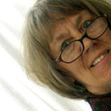Aleppo
"Go to Aleppo!" my father-in-law exhorted us, on many occasions. It was his favorite among all the ancient cities, and he wanted us to see its beauty, which he described to us in detail, eyes closed, rhapsodizing. He and his two sons had gone to Damascus in 2000: a nostalgic final trip for the 90-year-old father and a bonding and learning journey for the sons, the elder of whom had been born there. My husband, the younger son by 11 years, came home and immediately wanted to us plan a trip to go back together, to both Damascus and Aleppo. And we did just that, sending our passports to the Syrian embassy for the requisite visas. But shortly before we were supposed to leave, the political situation became very unstable, and we decided -- most unfortunately, in hindsight -- to postpone. As we all know, our entire world, and the Middle East in particular, changed irreparably after that, so we never made it to the city Mounir had loved and which no longer exists; what he remembered will never be seen again.
Back in 2016, Charles Wilkins, a professor at Wake Forest University, was interviewed about Aleppo on an episode of All Things Considered. He spoke of how Aleppo, one of the longest continually-inhabited cities of the world, had been well-placed historically as a caravan city and meeting point of east and west, and survived many occupations and sieges over the millennia. Called "the Jewel of Syria", he described it in terms my father-in-law would have loved, before saying "I can hardly put into words my emotions in seeing this city brought to its knees in this way."
My father-in-law fortunately didn't live to know about the destruction of Aleppo in the civil war, and now that part of Syria has undergone yet another tragedy. To make matters even worse, international aid to the region, some of which is held by non-government forces, has been delayed or refused by the Assad government, which makes it hard to know if contributions of money are even getting through.
I have nothing wise to say about any of this, just that I am sick at heart about this degree of suffering, and felt the need to put that into words here, for the sake of my family, the people I know who care about this region, and all those I don't know who are still there. Someone commented, after seeing the pictures of the earthquake devastation and the death toll figures, "There is no God," and I understand their reaction. Why this should happen, to people who have already suffered so much, defies comprehension, not just faith, if one is supposed to have faith in an intervening deity. However, there is one truth that believers and non-believers ought to be able to agree on, which is that human beings can either love one another or not; when we do, we are able to help one another in the midst of great tragedy, and when we don't, we not only create but compound enormous suffering.



